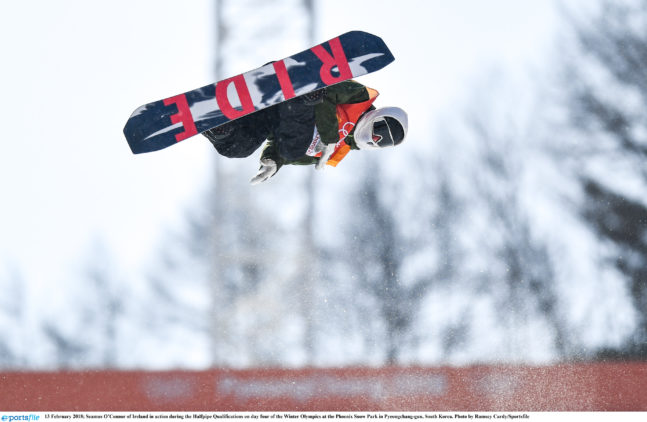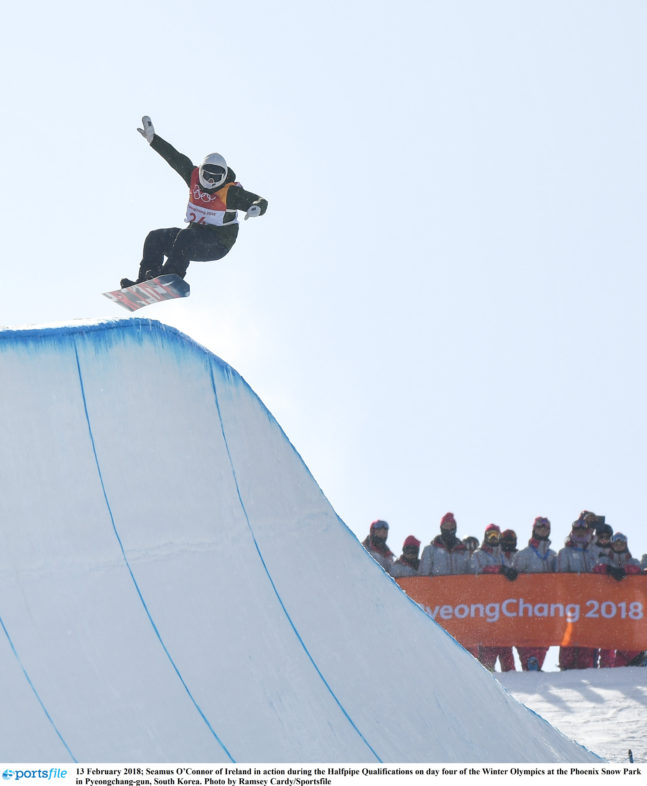SEAMUS O’Connor may only be 24 but the halfpipe snowboarder is already a two-time Olympian and the eminence gris of Irish snow sports.
Raised in California, with paternal grandparents from Drogheda and Dublin, he made history in Sochi eight years ago when he wasn’t just Ireland’s first Olympic snowboarder but also, aged 16, the youngest snowboard competitor, finishing 15th in the halfpipe and 17th in slopestyle.
Despite a bad knee injury in 2016 that lost him a full season he got back in time for PyeongChang in 2018 and, after such disrupted preparation, just concentrated on halfpipe where he finished 18th of a field of 30.
He started university in Westminster College in Salt Lake City four months later and has spent the last four years mixing study and snowboarding in nearby Park City but is taking this semester off completely to concentrate on his sport.
Studying a double major in psychology and sports management he wants to specialise in sports psychology when he graduates later this year. His father Kevin grew up in England and his mother is Russian so he’s hoping to do his next studies abroad.
“I’ve wanted to move to Europe for a while now because of my family ties and personal preferences plus the level of education. I have my Irish passport and feel very connected to Europe in a lot of ways so I think it would be a great opportunity.”
Seamus’ interest in sports psychology is not surprising given his own background.
He was a snowboarding prodigy who got his first sponsor when he was just 13 and had a lot of pressure to deal with as a teenage athlete.

“It’s a scary sport and injury is always in the back of your mind but I only worked with a professional sports psychologist once before and I think that (more) would have helped me with my progression.
“I remember being young and setting all these goals in my mind. Looking back now some of them were probably a bit unrealistic to live up to. So then I had to deal with falling short of those and thinking how to re-group and still accept that I was good at the sport.
“It definitely got difficult but my main knee injury in 2016 came at an interesting time. I’m still thankful for what it taught me because it allowed me six to eight months of reflection that I think I needed. It allowed me to re-set and think about what is my main motivator.
“After that I understood just how much passion and love I have for the sport and then it became a lot easier to go out there and just do the sport for me.
“To recognise that regardless of results or sponsorships or what anyone else thought or invested into me, that as long as I was enjoying it and progressing at a level that made me feel good, that was what was most important.”
He’s had to keep pace in a young sport that has progressed rapidly.
Halfpipers are now doing 1440s (quadruple spins) and even making an Olympics has got harder, with just 24 halfpipe spots available in Beijing (February 4-10), six less than in 2018.

He has also been hampered in the run-up by another knee injury, suffered in training in Austria in November.
“The dream would be to make the top 15 but right now I’m concentrating on staying healthy and enjoying the journey. I’m not sure if I’ll be going for another Olympics after this so I’m trying to soak up every minute as this could be my last competitive season.”
He may still be just a student of sports psychology but the practical insight and experience he’s already amassed should prove a huge help to his teammates in China, especially those making their Olympic debut.
“My advice to anyone is to try to stay in the moment. The Olympics are overwhelming, eye-opening and non-stop, totally different from anything else you’ll ever experience in sport,” he explains.
“First up you have the Olympic Village. There’s designated transport to take you to your venues and a massive dining hall two minutes from where you live, filled with the best athletes from all over the world.
“On top of that, for those few weeks, the entire world is watching you and that matters in how you compete and represent Ireland, in how you conduct yourself at all times.
“You’re no longer doing it for yourself, you’re doing it for your family and the people of your country back at home. So you have a responsibility to them to be the best that you can be, in competition and out of competition. I don’t think there’s any other competition in sport that requires that of you.”

